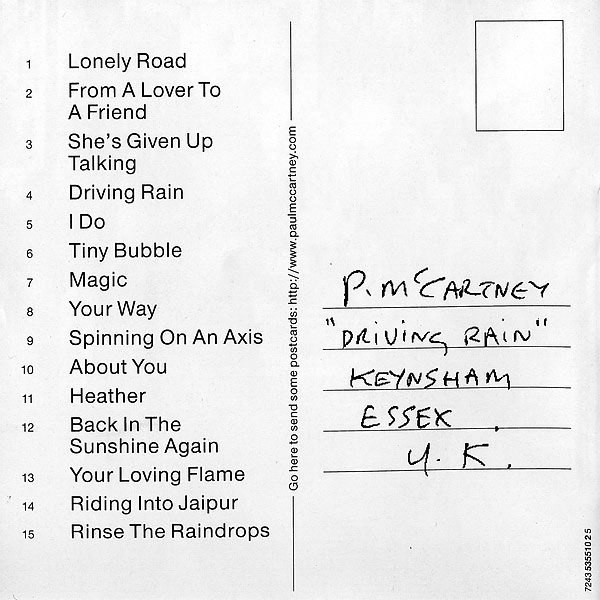After the excellent, melodic rock of Flaming Pie and the rootsy rock 'n' roll covers of Run Devil Run this was another credible Paul McCartney album. It was also maybe his last one constructed as one to still appeal to the contemporary music-buying public as opposed to later ones, which seemed to almost revel in the ageing process at times.
There was, thankfully, no "whimsy" on here, such as appeared on later albums. It was far more of a slightly arty, melodic rock offering. It was not as straight ahead rock as Flaming Pie had been. There is more experimentation with different sounds and moods. It is actually quite an inscrutable album, quite difficult to pigeonhole or characterise.
At sixteen tracks, it was a typical early 2000s album, full of well over an hour's music. Too much for my liking. I prefer the old seventies forty-five minute albums. The sound quality is excellent too, not affected by the off-putting, crashing loudness which blighted "Memory Almost Full" in particular, and, to a lesser extent, Chaos And Creation In The Backyard. Here it is rich, warm and bassy, as it should be.
Lonely Road is a muscular, confident rocker of an opener, with a throaty vocal. From A Lover To A Friend is a solid, slow rock ballad with a laid-back, dreamy vocal and delicious, rumbling bass line. McCartney's delivery is almost improvised in a bluesy jazzy way at times. She's Given Up Talking is full of buzzy guitar and intense, moody drum backing, plus some contemporary scratchy sound effects.
Driving Rain is recognisable Paul McCartney, with airs of both The Beatles and Wings, but it also has contemporary instrumental stylings. It is this sort of thing that makes this a more credible, memorable album than others. I Do is a short, melodic ballad, with a fetching vocal and another lovely bass line and some Beatles-esque brass sounds near the end.
Tiny Bubble has echoes of Queen's eighties material in small places, for me, although others may not pick up on that at all. Something about the "all the world's a tiny bubble" refrain. Magic is a pleasant enough number that just washes over but doesn't particularly stick in the mind. Your Way is a Wings-like appealing love song. Spinning On An Axis tries to create a hip/hop style groove with its staccato vocals and big, shuffling, resonant drum beat. It is actually quite an intoxicating track.
About You is a thumping, chugging rocker. Heather was in tribute to his wife at the time, and is a tuneful instrumental at the beginning, with bits of prog-rock style guitar and organ interplay, some ambient vocals appear at the end, without any real discernible meaning and what sounds like a sheep bleat in the background at the end.
Back In The Sunshine Again harks back to Wild Life from the early seventies, for me. It has a scratchy guitar sound and a vocal that takes me back to that earlier track. It has an understated mysterious appeal to it. Your Loving Flame starts slowly, with a beguiling, wistful vocal and crashes into a big guitar part in the middle and some lovely organ in the backing. That's it now for regular tracks. Riding Into Jaipur features Indian instrumentation that, of course, George Harrison would have loved. McCartney's vocals, intended to fit in with the Indian sound, leave a bit to be desired, however.
Rinse The Raindrops goes on for over ten minutes. It is full of fuzzy guitar breaks and pounding drums and a convincing, committed rock vocal from McCartney. As a four minute rock number, it would have been fine. After not even three minutes it turns into an extended studio jam, with occasional returns to the vocal, like the stuff at the end of George Harrison's All Things Must Pass. Having said that, there is a funky organ rhythm underpinning it and a general lively feel all round. I quite like it, but the last two minutes are pretty superfluous. Freedom was a response to September 11, 2001. It is very Lennon-esque in a Power To The People sort of way. Overall, I prefer the smoother, warmer tones of Flaming Pie, but this is certainly an impressive, relatively innovative offering.








